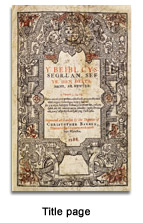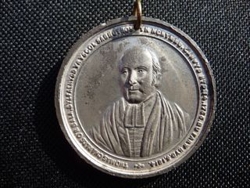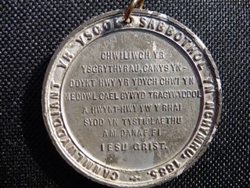 Follow The Welsh Bible
Follow The Welsh Bible
David Foster, Pastor of the North Wales Adventist Churches. It has been rightly said that both the nation of Wales and its language would not exist today, at least not in the form that we know it, if it wasn’t for the existence of a Bible translated into Welsh. That would seem at first sight to be an extreme view – but it happens to be true. Let me start with a poem written by the Reverend Thomas Jones, vicar of Llanfair or Llandeilo Bertholau in Monmouthshire. Without the help of God’s own book Or learning of any kind, Without true teaching given him, The Welshman was quite blind But now it is my earnest hope, In this my faith is bright, That after suffering ages long The Welshman is given sight. ... To Bishop Morgan for his pains We must give thanks the most, For putting into Welsh the Book With the strength of the Holy Ghost. The year is 15 The Bible in Welsh had come from the printers in London in the Autumn, reaching Wales late in the year – hence it was a ‘present’ around Christmas time. As Paul wrote to Timothy :- 2Tim. 3:16,17 All scripture is inspired by God and is useful for teaching, for reproof, for correction, and for training in righteousness, so that everyone who belongs to God may be proficient, equipped for every good work. But that’s not much consolation if you cannot read it! Being as how most people did not know how to read and write in their own language – it meant the Bible was off limits to all but a select few highly educated people. With the Reformation the Bible began to be translated into German and English, but the ‘dawn’ was slow to break in Wales When in 1558 Queen Mary’s bloody persecution of protestants came to an end and Queen Elizabeth came to the throne, two acts of parliament in 1559 and 1563 re-established a moderate form of the Church of England – conformity was the ideal. What then, of the Bible in Welsh? In 1563 came a big surprise Parliament passed an act allowing the Bible and Book of Common prayer to be translated into Welsh. As soon as the act was passed, it would be compulsory to use the Welsh versions everywhere that Welsh was a common language Bishops of Wales and Hereford were commissioned to carry out the work of translation The effect on the use of the Welsh language was profound – it has been said that the act of 1563 to translate the Bible into Welsh was as important in its consequences as the Act of Union in 1536 ! How did it ever get past an English parliament? Probably because unity in religion was more important than unity in language English parliaments were afraid that Wales would turn Catholic – so promoting the Welsh language was a small price to pay for the nation becoming staunch protestants. Early translations struggled because of the use of obscure and difficult Welsh phrases, and did not find much favour. The result was pretty unreadable an incomprehensible. The translators fell out after the New Testament was published (it is said over the translation of a single word!) So there was a long gap before Sir John Wynn of Gwydir handed over the partly completed translation to Bishop William Morgan in 1572 William Morgan was born in a house called Ty Mawr in the parish of Penmacho, in the Conwy valley near Betws-y-Coed (now a national trust property) He was the son of a tenant on the estate of Sir John Wynn, and he arranged for the young William Morgan to be educated, first locally and then at St. John’s college Cambridge. An intelligent student his circle of friends combined Protestantism with Welsh bardistry. He studied Greek, Latin, Hebrew, Divinity, mathematics, logic, rhetoric and philosophy, gaining an MA in 1571 A Welsh Bard – Sion Tudor commented in a poem of thanks for the Welsh Bible : You translated and took the Word of God At great pains from the Hebrew text, This you did when the age of Christ Was sixteen hundred years but twelve, Translating every chapter Of the Bible for the sake of benighted folk. In 1583 he gained a Doctorate in Divinity from Cambridge. Unlike other translations of the Bible which have been done by committees – the Bible that William Morgan translated was all his own work, although based in part on the previous half finished foundations. As well as undertaking his parish work as Bishop of Llandaff he translated the Bible from 1579 – finishing in late 1588 when a copy was given to the library of Westminster Abbey – where it remains to this day. It was a great work, and a great struggled – he nearly gave up several times – but was sustained by the encouragement of the Archbishop of Canterbury – Whitgift. His great motivation – to present the Welsh with the truth – so they could make out what was from the Bible, and what was other people’s commentary. You made each word sound so sensible The word of God so comprehensible! What was the effect of publishing this Bible? Well Protestantism was firmly established as men and women could read it for themselves. But also it had the effect of creating a scholarly version of standardised Welsh (based on the Northern Welsh dialect) – it gave a sense of unity to the nation It was so good that it received a warm reception. Revised by one of Morgan’s successors at St Asaph – Bishop Richard Parry in 1620 it remained the basis for all subsequent revisions up to the twentieth century, much like the King James Version of 1611 was the basis for English Bibles. These Bibles were big -- Chained to the lecterns of churches, and shelves of libraries! It was only in 1630 that a smaller version was produced – the “Little Bible” costing a (very expensive) 5 shillings. Then what? 88 and a troubled one in the history of both Wales and England – Thomas Jones had already written a ballad of thanksgiving for relief from the Spanish Armada.
88 and a troubled one in the history of both Wales and England – Thomas Jones had already written a ballad of thanksgiving for relief from the Spanish Armada.
Well in 1737 Griffith Jones set up a network of Welsh circulating schools in Carmarthen to teach common people to read the Bible.
 |
 |
|
"100 years of Sabbath School in Wales" medal: 1785 - 1885 with Thomas Charles on the front. |
People were encouraged to read the Bible at home, by the Methodists and Baptists and by 1786 William Morgan’s translation really came into its own when innumerable Sunday Schools were set up the length and breadth of Wales under the inspiration of Thomas Charles of Bala.
You have probably all heard the famous story of the visit of 15 year old Mary Jones to Charles at Bala in 1800. She had saved up three shillings and sixpence to buy a Bible – it took her three years! The she walked barefoot from Llanfihangel-y- Pennant in Merionethshire to buy a Bible from him He was so moved by her heroic self sacrifice that he used his influence to form the British and Foreign Bible society in 1804. A society which still flourishes today!
All from the influence of that one translation...
What an amazing thing was accomplished by a young girl!
But even more amazing is what was achieved by William Morgan’s translation of the Bible.
The effects have gone around the world, changing whole nations, bringing many, many people to Christ
The influence of that Bible spread to every corner of Wales – since there were very few other books available in the language.
It has been truly said that the Welsh were a ‘nation of one book’, and that book was the Bible of William Morgan.
It changed the relationship of Wales to England – there were plans in hand that if Wales had turned Catholic, as seemed likely at one point, then protestant loyal Englishmen would have been planted in colonies to ensure Welsh loyalty, in the same way that Scottish landowners were planted in Ireland.
What heartache and strife that might have led to ...
It would have been enough to destroy Wales, when you think how small Wales was, and how large England ...
The very survival of the Welsh nation and language is due in no small part to the Bible of 1588.
The gospel was preached, and a thousand chapels and congregations sprang up. The very place names in Wales reflect this Christian heritage – everywhere that you see the phrase “Llan” as part of a place name, such as Llanstephan” – it means “church plant” – that is to say “the church that Stephan planted”
Sadly today we are in danger of losing this rich Christian heritage. Everywhere you travel in Wales you see chapels for sale by auction. They are turned into coffee shops, bars and private houses. It has been said that church attendance in Wales is now lower that that in England – and that is only 3 – 5%
We have this book, and the English equivalent in our hands only by the sweat, tears and even martyrdom of those generations that went before us. God worked with those people to ensure that we have in our hands a version of His word that we can read in our own language.
We did not have to save up for three years to buy it, or walk barefoot over the mountains to get it. We did not have to learn Greek, Hebrew or Latin to understand it.
So being as how this book has come to us through heartache, pain and sacrifice of previous generations – let’s not squander the opportunities that we have to read it, meditate on it and let God’s good instruction - this amazing good news of the gospel, into our lives day by day
Make time each day to read a little of God’s word – and it will change our lives
Wales was known as the “nation of the book” –
But now sadly it isn’t
Adventists were known as “people of the book”
Don’t let us have the same epitaph....
The nation of Wales was once transformed by coming into contact with God’s word, and it can be again.
But more important than that – we too can be transformed by the uplifting, enobling, enriching Word of Truth as we study it day by day.
I will leave the last word to George Owen of Henllys, Pembrokeshire, writing in 1591
“No country in England so flourished in one hundred years as Wales hath done, since the government of Henry 7th to this time, in so much that if our fathers were now living they would think it some strange country inhabited with a foreign nation, so altered is the country and countrymen, the people changed in heart within and the land altered in hue without, from evil to good, and from bad to better; the Lord continue his goodness towards us and make us thankful; and not now three years past we have the light of the gospel, yea, the whole Bible in our own native tongue, which in short time must needs work great good inwardly in the hearts of the people.”
What was true in 1591 is still true, whatever your language, in 2009.
More information on Follow the Bible can be found on the Adventist Church headquarters website.
You can also read the Bible online in Welsh or in many other languages.
The National Library in Wales contains a more detailed history and pictures of the original Welsh Bible.